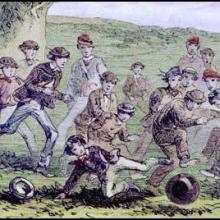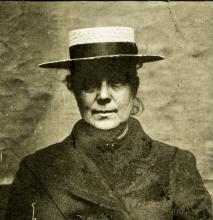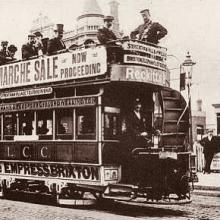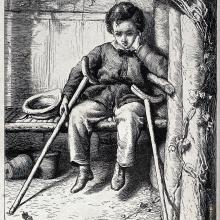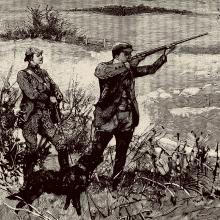
1906
EDINBURGH GUNMAKER’S DOWNFALL.
HOW CUSTOMERS WERE DEFRAUDED.
Alexander Hendry, an elderly man, was charged at a pleading diet of Edinburgh Sheriff Court today, with a number of thefts.
In his shop in East Register Street he got two guns to be repaired, and he pledged them; he got 25s from a gentleman in Baden Baden, Germany, to pay for a dozen golf balls, but failed to supply the order, and under similar circumstances got £1 from another party. He was also charged with having pretended to certain firms that if they sent him goods he would pay for the same, and in this way got several dozen golf balls, several guns, and over 5000 cartridges. He pleaded guilty.
On his behalf it was stated that he had been in business as a gunmaker in Edinburgh 35 years. Within the last few years he had had difficulties about money matters. With reference to the first gun which he got, it had been sent to him for repair. He repaired it and sent in the account, but the gentleman would not pay till he got the gun back. Accused was short of money, and he pawnad the gun, but the following week, when he went to get it he found the police had possession of it.
Regarding the golf balls, Henry had a patent for golf balls, and they were manufactured by a firm in the city. He was told by a gentleman in Glasgow that some of the balls were splitting. Accused received the orders, and was unable to carry them out.
With reference to the goods got from firms, the agent said these firms were in the habit of dealing with Hendry, and the goods were orders for the season. Accused had sold a great many of these articles—rifles and golf balls.
Mr Renton, the Fiscal, said the value of the goods was £85, and they were pawned to the extent of about £29. Sheriff Maconochie said the case was a sad one, considering the position which accused had held in Edinburgh, but his lordship could not overlook the fact that the thefts had been on an extensive scale, and they had continued for more than a year. The sentence would be four months’ imprisonment.
An application was made on behalf of the pawnbrokers for the money they had advanced. Sheriff Maconochie said he did not think the people who sent the goods were in any way to blame, nor did he think the pawnbrokers were to blame, because such things were known as pawning in temporary difficulties. The pawnbrokers would get half their advances.
Edinburgh Evening News, 6 February 1906
[1] Image top-right: Wikipedia, Creative Commons.
*****
A DUKE STREET LANE THEFT. —For the theft of a table and barrow from Duke Street Lane, Miles Gilhooley was to-day sent to prison for thirty days by Sheriff Guy in Edinburgh Sheriff Court.
The articles were taken from outside a cabinetmaker’s shop, and the Sheriff said that had Gilhooley not been associated with a worse character than himself, he might not have been in the position he was.[2]
Edinburgh Evening News, 11 January 1906
[2] See report of 6 February 1906 below.
*****
COOL THEFT OF TABLE.
A middle-aged man, named Martin Moffat, was tried before Sheriff Maconochie and a jury at Edinburgh Sheriff Court to-day on a charge of stealing a table and barrow from Duke Street Lane.
The table and barrow had been outside a cabinetmaker’s door, and accused, and a man, Gilhooly, who had been sent to jail at a previous Court for the defence, had asked the cabinetmaker if he had any brass for sale. The table and barrow disappeared after they left, and the table was sold to a man Higgins.
For the defence, Gilhooly, who was brought over from the Calton Prison, said accused was not the man who was with him, but it was a man Johnstone. They had met accused near Higgins’ premises, and had asked him to wait, saying they would give him a drink. Accused said he was working with a stevedore in Leith on the day of the theft, and met Gilhooly while he was coming up from Leith.
The jury, after an absence of a few minutes, returned a verdict of guilty, and the Sheriff passed sentence of eight months’ imprisonment, remarking that accused had an extremely bad record.
Edinburgh Evening News, 6 February 1906
*****
LAUNDRY.—Wanted at once, good shirt and collar ironer.—Imperial Laundry, Dublin Street Lane.
Edinburgh Evening News, 21 February 1906
*****
QUEEN STREET NEIGHBOURS AT LAW.
Some time ago an action was raised in the Court of Session by James Purves, S.S.C., 32 Queen Street, Edinburgh, against Burn Brothers, plumbers, carrying on business at 69 North-West Thistle Street Lane, Edinburgh, to have the defenders interdicted from using, within their workshop, which is in the rear of the complainer’s dwelling-house and office, a dynamo engine to the complainer’s annoyance.[3]
The complainer alleged that the noise and vibration emanating from the respondents’ premises were unbearable, and constituted a nuisance. The respondents denied that they were causing any nuisance.
In the Outer House Lord Johnston found that the noise was a nuisance, but continued the case to allow the respondents to state what they proposed to do to stop it. The respondents reclaimed to the First Division, which today recalled the Lord Ordinary’s decision, held that the specific instances founded on by complainer were temporary, and did not constitute a nuisance sufficient to justify interdict going out. Neither party was entitled to expenses.
Edinburgh Evening News, 20 March 1906
[3] See S (5.8.05).
*****
DEATH OF A “THIN RED LINE” VETERAN.
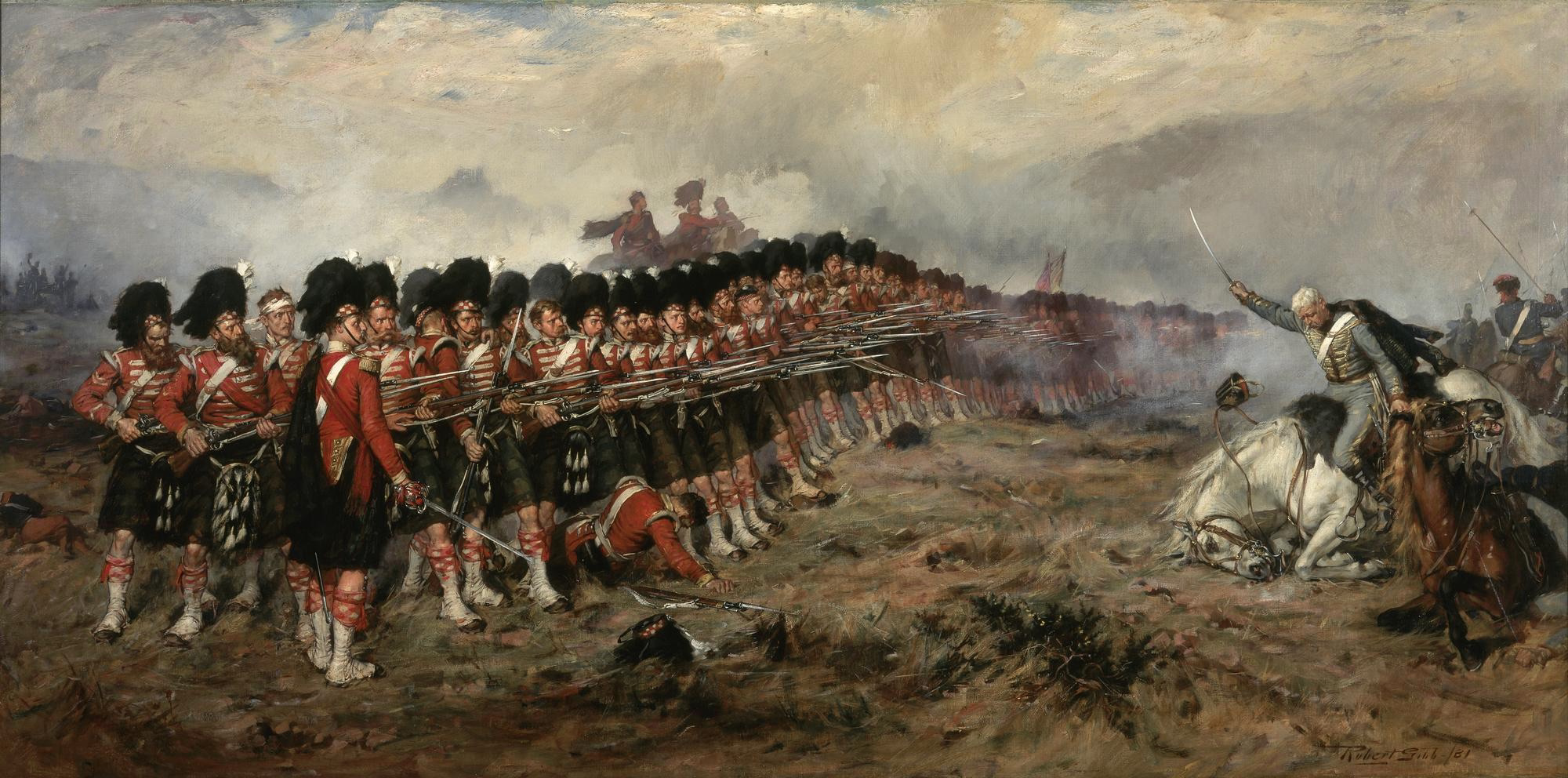
Yesterday the death occurred of Andrew Petrie, Greenside Row, Edinburgh, at an advanced age, deceased being one of the “Thin Red Line” veterans.
Petrie enlisted in the Camerons in 1852, and on the outbreak of the Crimean war volunteered for the 93rd Regiment. He served through the campaign and got the Turkish medal, while he also received the medal for Alma, Balaclava, and Sevastopol.
The regiment were turned back on their way to China, on the outbreak of the Indian Mutiny, and Petrie served through this trying period, and held the medals and clasps tor Lucknow. He was discharged in 1863, but put the remaining years in the Reserves.
Edinburgh Evening News, 24 March 1906
[4] Around 500 men of the Sutherland Highlanders formed a Thin Red Line during the Battle of Balaclava on 25 October 1854, beating off repeated charges by Russian cavalry. The regiment helped suppress the Indian Mutiny (1857–59), and remained in India on garrison duty until 1870. Petrie, an umbrella maker, died at 30 Greenside Row, aged 68, of bronchitic debility (685/3135). Image: Rober Gibb, The Thin Red Line (1881).
*****
BURGLARS AT THE ALBERT HALLS
SCARED BY WOMAN.
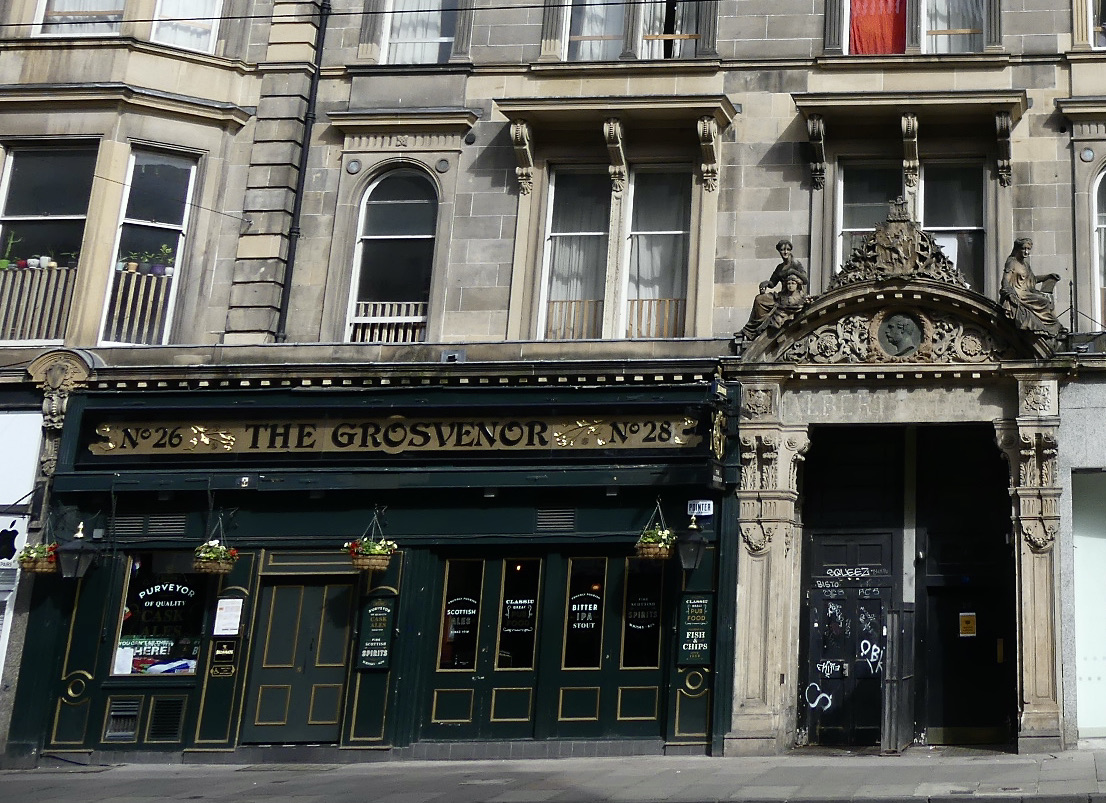
A daring attempt at burglary by burglars who seemed to know their way about pretty well took place last night at the Albert Halls, Shandwick Place, but by the prompt action of Mrs White, the wife of the manager, Mr Charles White, the intruders were scared away before they could lay their hands on anything.
The stage entrance to the Halls is from Queensferry Street Lane, and it was by it that the burglars got in. The occurrence happened about ten o’clock, and as the stage door is not locked while the performance is going on, there was no difficulty in that direction. After entering by the street door there is a small passage of about eight yards or so, and then a glass door with obscured glass. Last week one of the panes of glass in this door had been smashed, and two pieces of cardboard had been nailed across the aperture. This door was also open, and at right angles to it on the left there is the door to one of the dressing rooms, that room being this week occupied by Miss Mildred de Grey, the lady barefoot-dancer.
WATCHING THROUGH SPY-HOLE.
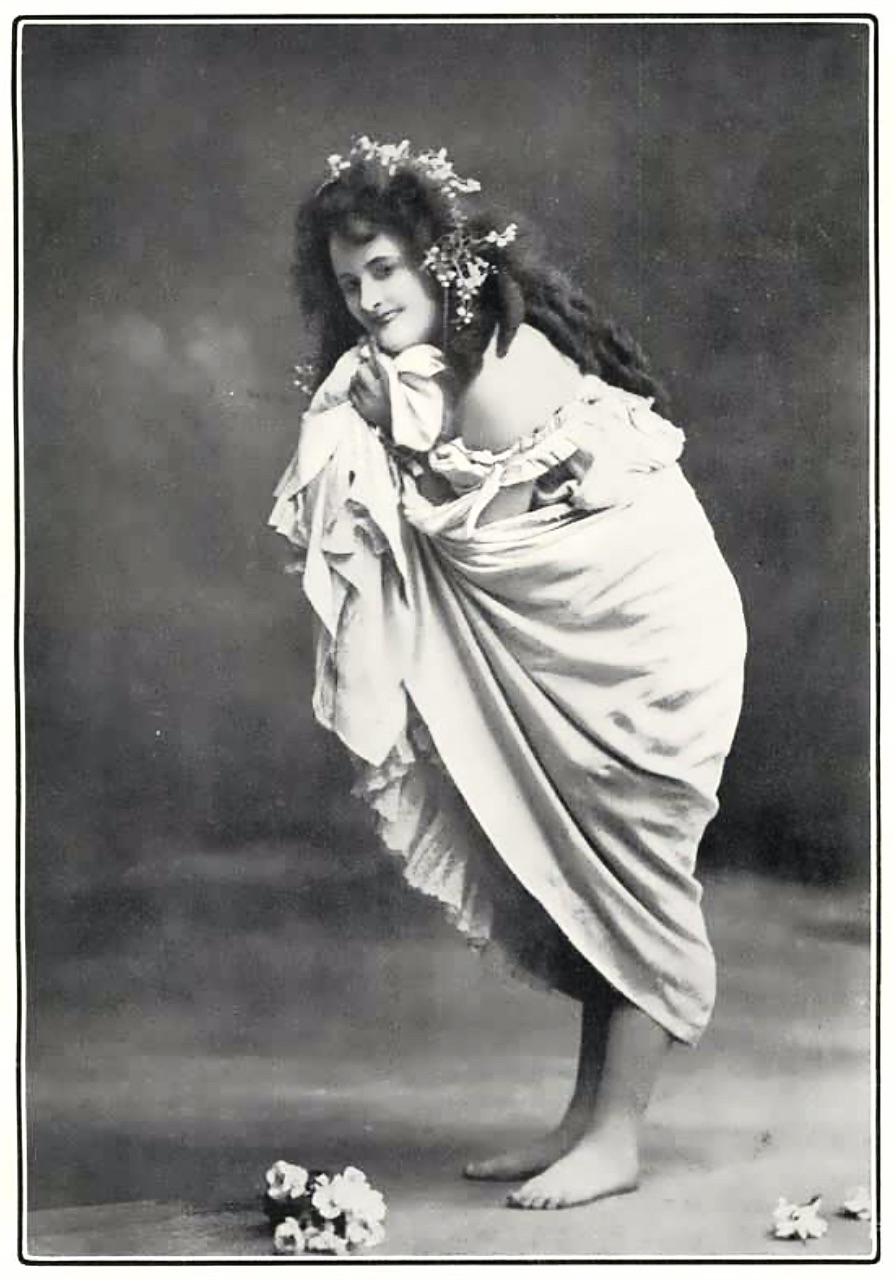
Mrs White was with Miss de Grey last night in the dressing room, and when the sketch “Matrimonial Bliss” was being performed, Miss de Grey left the room to go on to the stage, evidently to see the sketch. By this time it would seem that the thieves had got in by the stage door and were at the glass door, and this supposition is borne out by the fact that subsequent investigation showed that a hole had been made in the cardboard from the outside, through which the burglars had evidently been watching, for just after Miss de Grey went out, Mrs White, who still remained in the room, heard whispering.
At first she thought it was only some of the employees, but when she caught something about “look out” she became suspicious that all was not right, and she waited on the alert. Presently—the burglars thinking that Miss de Grey had been the only occupant of the room—the door was cautiously opened, and a head thrust round near the bottom, the owner having evidently gone down on his knees. As soon as Mrs White saw the man she screamed, and the intruder, being as much scared as the lady, rushed madly out with two companions, who were with him.
Just at the time the incident occurred the sketch had reached a stage at which a considerable din is made by the actors, and this to a great extent drowned Mrs White’s cries and the scuffling made by the escaping burglars, and some time elapsed before any of the men connected with the place reached the scene.
OPPORTUNITY FOR A SMART ARREST.
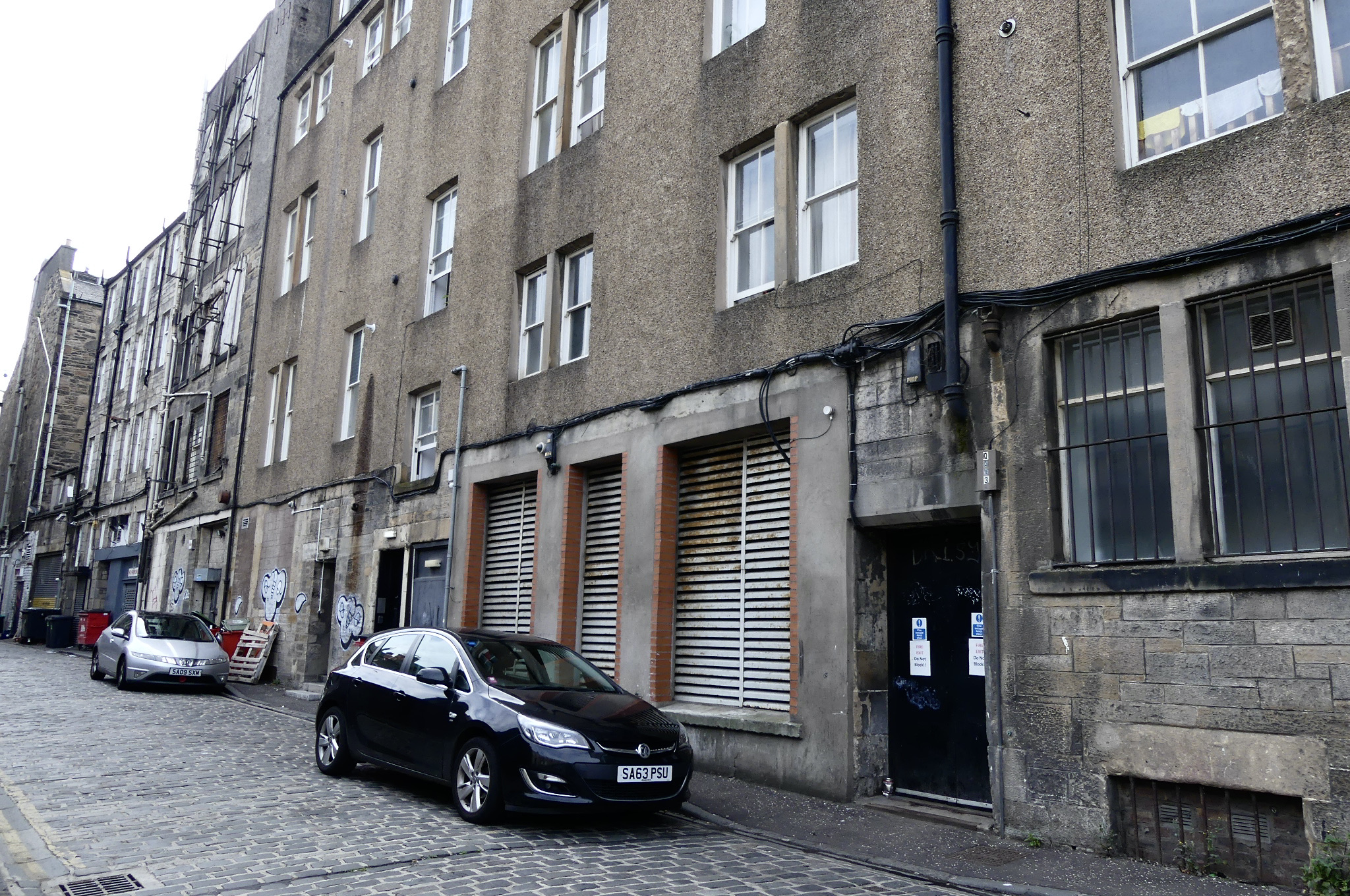
At once a number of them went outside and conducted a search in the neighbourhood, but everything was dark, and as the men had got a start, the hunt was unsuccessful. As only a glimpse of the face of one of the men was got by Mrs White, and the only other person who saw the intruders was one the employees first on the scene who saw the heels of the last man disappearing through the doorway, there will be little for the police to go upon.
The finger marks on the cardboard, however, might give a smart detective the opportunity to make a clever arrest, for if the men are “known thieves” their finger prints will in all probability have been recorded by the Bertillon system.
Had the thieves got into the dressing-room they might have had a good haul, for Miss de Grey had jewellery there of considerable value.
Edinburgh Evening News, 29 March 1906
[5] The beautiful and charming, modest and winsome American Mildred Howard de Grey's barefoot routine caused a sensation when she debuted in Britain in 1906. According to the Daily Telegraph and Courier, the captivating young lady (pictured above in an unsourced online image available on eBay) had only lately 'returned from St. Petersburg, after falling into the hands of the revolutionists, and escaping at the cost of rough experiences, and some personal injury' (23.1.06). A likely story. Nothing resembling her pretty pink dancing toes and ankles had been seen here before, and the erotic charge which surrounded them is evident in the through-the-keyhole and ankle-level angles of this supposed crime report. I have found no trace of her on the UK stage after November 1913.
*****
LOST AND FOUND.
WHIPPET, blue bitch, white on feet, lost on Saturday; return Bell, Canon Lane, Canonmills.
Edinburgh Evening News, 17 April 1906
*****
FOR SALE, PEUGEOT LANDAULETTE, 10–12 H.-P.; in use only 6 months, and in first-class running order; all Accessories; perfect Town Car or for Doctor. Apply Mr YOUNG, 38 West Register Street; or ROSSLEIGH CO., Shandwick Place.
Scotsman, 25 May 1906
*****
Heritable Property to Let.
EDINBURGH, LEITH, &C.
MOTOR house to let in Queensferry Street Lane, West End, with man’s house above; just built, and fitted with electric light, pit, and all up-to-date conveniences. Apply, Wood, 19 Alva Street.
Scotsman, 8 June 1906
*****
FATAL ACCIDENT IN EDINBURGH.
A man named Charles Morgan, 48 years of age, residing at 4 New Broughton, died in the Royal Infirmary this morning. It appears that on Saturday night he was badly injured by falling down-stairs in his house, and he was taken to the Infirmary last night. The base of his skull was fractured, and he had sustained some scalp injuries.
Edinburgh Evening News, 21 August 1906
